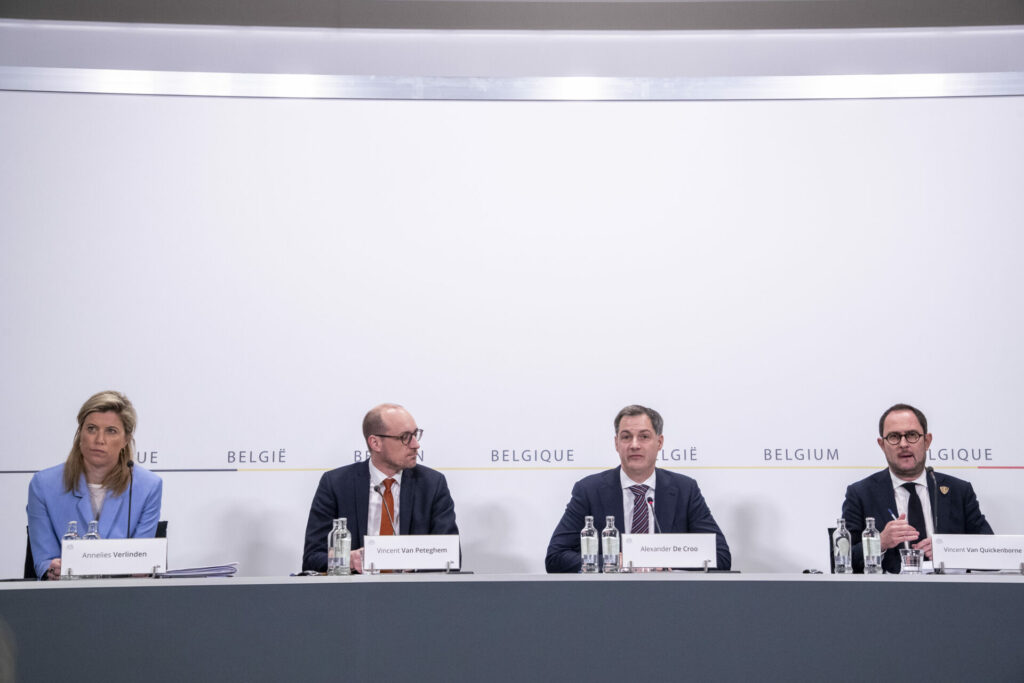Belgium's Federal Government is taking seven measures to tackle organised drug crime in the country, Prime Minister Alexander De Croo announced during a press conference on Thursday following a National Security Council meeting.
The meeting took place on Thursday morning following calls from multiple authorities in Antwerp – which due to its large port is one of the Belgian cities most affected by drug traffickers – after a recent series of violent drug-related incidents.
"Today we have entered the phase of 'narco-terrorism', in which the underworld is more and more threatening people from the upper world," said Federal Justice Minister Vincent Van Quickenborne. "We see this in the port of Antwerp, but also throughout the country. It's not only about cocaine, but also ecstasy labs and retaliations and other settlements in the drug environment, for example."
De Croo stressed that the fight against drug crime is "an absolute top priority of this government," which is why the government presented a package of seven measures "to stop and root out drug crime."
Therefore, the Federal Government is taking seven specific measures:
Firstly, a national drugs commissioner will be appointed to coordinate efforts against drug crime over the next five years. Who should take on that role will not be announced until Friday (tomorrow).
This drugs commissioner, who will have a deputy and a 10-person commissariat, will work with the Ministers of Justice (Van Quickenborne), Home Affairs (Annelies Verlinden), Health (Frank Vandenbroucke) and Finance (Vincent Van Peteghem), as well as with the other relevant administrations in the country. The commissioner will also have to report to the National Security Council.
There will be a "port security corps," which is a new police force within the maritime police that will physically guard and secure the Port of Antwerp. In the short term, 100 officers will be deployed for this purpose, including from the federal police reserve. The aim is to double that number by the end of 2024.
"Illegal drug trafficking has no place in our port. That is why we are strengthening the Antwerp maritime police by 200 police officers," said Verlinden. "This reinforcement should help keep drugs out of the port of Antwerp, and drug violence out of our streets." Importantly, the army will have to take over surveillance of the Doel nuclear power plant to free up police officers to be deployed in the port.
Higher fines, better scanners
Local governments will be given more power against organised crime and drug-related violence, as well as money laundering, for example – a measure that was already in place but is included in this plan.
Cocaine users will face heavier fines reaching up €1,000 (three times as much as now). The alternative to such a heavy fine is mandatory rehab. "I cannot stress enough the social damage of drug use. It is gigantic," said De Croo.
More and better scanners will be purchased, which will eventually allow customs to check all suspicious containers at the port. The port staff across Belgium – some 16,000 people together – will be more rigorously vetted and screened, similarly to how airport staff is screened.
"This is not just about those doing manual labour, but also about white-collar workers, IT workers and even CEOs," said Van Quickenborne. "We will not just screen the criminal records, but all databases, those people's contacts and their financial situation. Because drug criminals are becoming bolder and bolder: they also try to bribe port staff."
Related News
- Belgian Government to hold National Security Council meeting
- 'All hands on deck': Belgian local authorities get extra tools to fight organised crime
- Legalising cocaine would stem drug violence, Belgian criminologist suggests
Police are trying to cooperate even more closely with foreign police forces and authorities, including with the United Arab Emirates; several more treaties were concluded with the UAE in the autumn, including on legal assistance and extradition.
"Now, the Emirates must show what they are worth," said Van Quickenborne. "They have made promises to us. We are now going to step up the pressure at all levels to put our money where our mouth is. For instance, we have handed over a list of targets we want to see extradited to Belgium."
Together, those seven elements should make the drug trade "physically more difficult, financially unprofitable and make the demand for drugs go down," De Croo said.

